mysql学习一 常用语句
操作系统为windows
1 启动关闭mysql服务
//windows mysqld --console //开启mysql服务 mysqladmin -uroot shutdown //关闭mysql服务 //linux(RPM安装方式) netstat -nlp //查看mysql服务的状态 service mysql start //开启mysql服务 service mysql stop //关闭mysql服务 //linux(非RPM安装方式) netstat -nlp //查看mysql服务的状态 ./mysqld_safe & //开启mysql服务 mysqladmin -uroot shutdown //关闭mysql服务

2 登录和退出mysql
mysql -uroot -p //登录mysql quit //退出mysql

SQL语句主要有三类:DDL、DML、DCL
2 DDL(Data Definition Languages)
数据定义语言,这些语句定义了不同的数据段、数据库、表、列、索引等数据库对象。常用的语句关键字有:create、drop、alter等
3 DML(Data Manipulation Language)
数据操纵语句,用于添加、删除、更新和查询数据库记录,并检查数据完整性。常用的语句关键字有:insert、delete、update、select 等
4 DCL(Data Control Language)
数据控制语句,用于控制不同数据段直接的许可和访问级别的语句。这些语句定义了的数据库、表、字段、用户的访问权限和安全级别。常用语句关键字有:grant、revoke等
3 DDL(对数据库对象操作)
3.1 创建数据库
create database testZS; //创建数据库 show databases; //查看有哪些数据库 use testZS; //使用哪个数据库 show tables; //某个数据库下面有哪些表

3.2 删除数据库
drop database testZS;
3.3 创建表
use testZS; //表建在哪个数据库里面
create table emp( ename varchar(10), hiredate date, sal decimal(10,2), deptno int(2) );
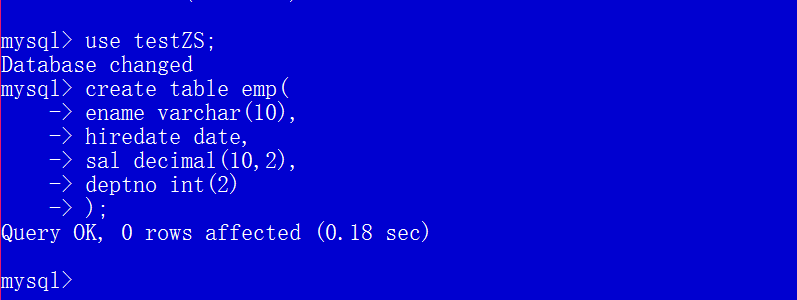
3.4 删除表
drop table emp;
3.5 修改表
//修改表名 alter table emp rename emp1; //查看表结构 desc emp; //增加表字段 alert table emp add column age int(3); //删除表字段 alert table emp drop column age; //修改表字段名称 alter table emp change age age1 int(4); //修改表字段数据类型 alter table emp modify ename varchar(20); //改变字段排列顺序 alter table emp add birth date after ename; alter table emp add age int(3) first;
4 DML(对数据库对象的数据操作)
4.1 插入记录
insert into emp(ename,hiredate,sal,deptno) values('zs','2018-01-01','2000',1); insert into emp(ename,sal,deptno) values('zs1','2000',2); //批量插入 insert into emp(ename,hiredate,sal,deptno) values('zs2','2018-01-01','2000',3),('zs3','2018-01-01','5000',4);
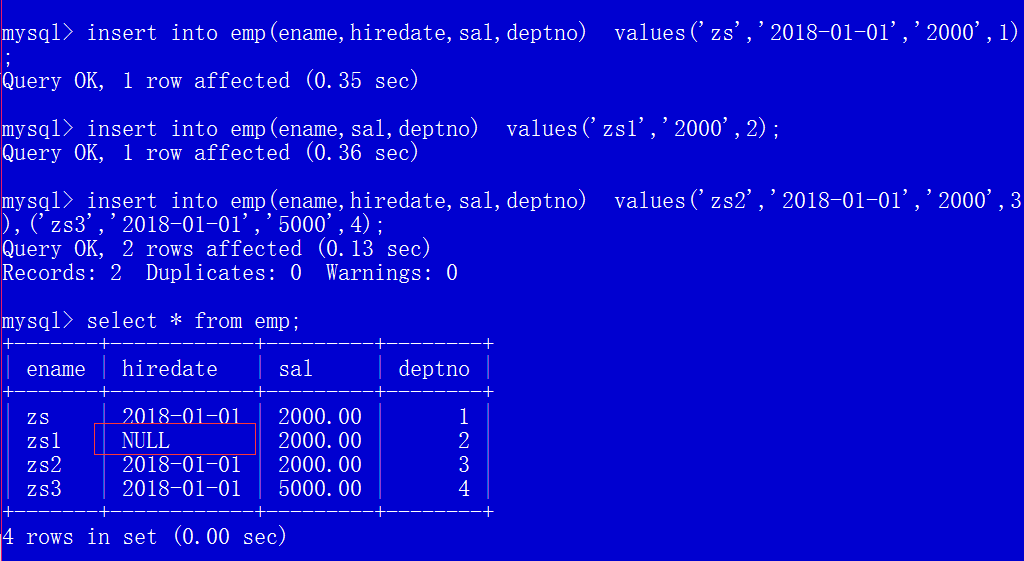
4.2 删除记录
delete from emp where sal='5000'; //多表删除 多个表的删除的条件需要对方的情况下 delete from emp a,dept b where a.deptno=b.deptno and a.deptno=3;
4.3 更新记录
update emp set sal=4000 where ename='zs3'; //多表更新 这种更新是更新的情况需要根据另一个表作为依据来更新 update emp a,dept b set a.sal=a.sal*b.deptno,b.deptname=a.ename where a.deptno=b.deptno;
4.4 查询记录
//1 查询所有字段,所有记录(条) select * from emp; //2 查询某些字段,所有记录(条) select ename,deptno from emp; //3 查询不重复的记录 select distinct deptno from emp; //4 多条件查询 select * from emp where deptno=1; //5 排序 desc 降序 asc 升序 默认升序 select * from emp order by sal; select * from emp order by sal desc,deptno asc; //6 限制记录数量 偏移量0开始 select * from emp limit 2; //前2条记录 select * from emp limit 1,2; //从第2条开始的2条记录(包括第二条) //7 聚合 (统计) select [field1,field2,...,fieldn] fun_name from tablename [where where_contdition] [group by field1,field2,...,fieldn] [with rollup] [having where_condition] fun_name:聚合函数 group by 分组 with rollup 是否对分类聚合后的结果进行再汇总 having 对分类后的结果进行条件过滤 select * from emp; select deptno,count(1) from emp group by deptno; select deptno,count(1) from emp group by deptno with rollup; select deptno,count(1) from emp group by deptno having count(1)>1; //空字符串'' 和null是不一样的。如果你输入的时候没有特别指定,存入就是null,但是如果指定'',则就是空字符串。 //常用所有聚合函数 sum(expr):求和 avg(expr):求平均数 count(expr):计数器,返回SELECT语句检索到的行中非NULL值的数 COUNT(DISTINCT), max(expr) 获取最大值 min(expr) 获取最小值 GROUP_CONCAT(expr):按照分组,将expr字符串按逗号分隔,组合起来
//8 记录联合 union(去重)、union all
//查询所有字段,所有记录(条) select * from emp; //查询某些字段,所有记录(条) select ename,deptno from emp; //1 查询不重复的记录 select distinct deptno from emp; //2 多条件查询 select * from emp where deptno=1; //3 排序 desc 降序 asc 升序 默认升序 select * from emp order by sal; select * from emp order by sal desc,deptno asc; //4 限制记录数量 偏移量0开始 select * from emp limit 2; //前2条记录 select * from emp limit 1,2; //从第2条开始的2条记录(包括第二条) //5 聚合 (统计) select [field1,field2,...,fieldn] fun_name from tablename [where where_contdition] [group by field1,field2,...,fieldn] [with rollup] [having where_condition] fun_name:聚合函数 group by 分组 with rollup 是否对分类聚合后的结果进行再汇总 having 对分类后的结果进行条件过滤 select * from emp; select deptno,count(1) from emp group by deptno; select deptno,count(1) from emp group by deptno with rollup; select deptno,count(1) from emp group by deptno having count(1)>1; //空字符串'' 和null是不一样的。如果你输入的时候没有特别指定,存入就是null,但是如果指定'',则就是空字符串。 //!=2 不包括null,但是包括空字符串 //常用所有聚合函数 sum(expr):求和 avg(expr):求平均数 count(expr):计数器,返回SELECT语句检索到的行中非NULL值的数 COUNT(DISTINCT), max(expr) 获取最大值 min(expr) 获取最小值 GROUP_CONCAT(expr):按照分组,将expr字符串按逗号分隔,组合起来 //6 表连接 内链接 查询匹配的情况 外连接 查询匹配和不匹配的情况 左连接、右连接 //7 内链接 select ename,deptname from emp,dept where emp.deptno=dept.deptno; //左连接 select ename,deptname from emp left join dept on emp.deptno=dept.deptno; //右连接 select ename,deptname from emp right join dept on emp.deptno=dept.deptno; //子查询 select * from emp where deptno in(select deptno from dept);
1 限制
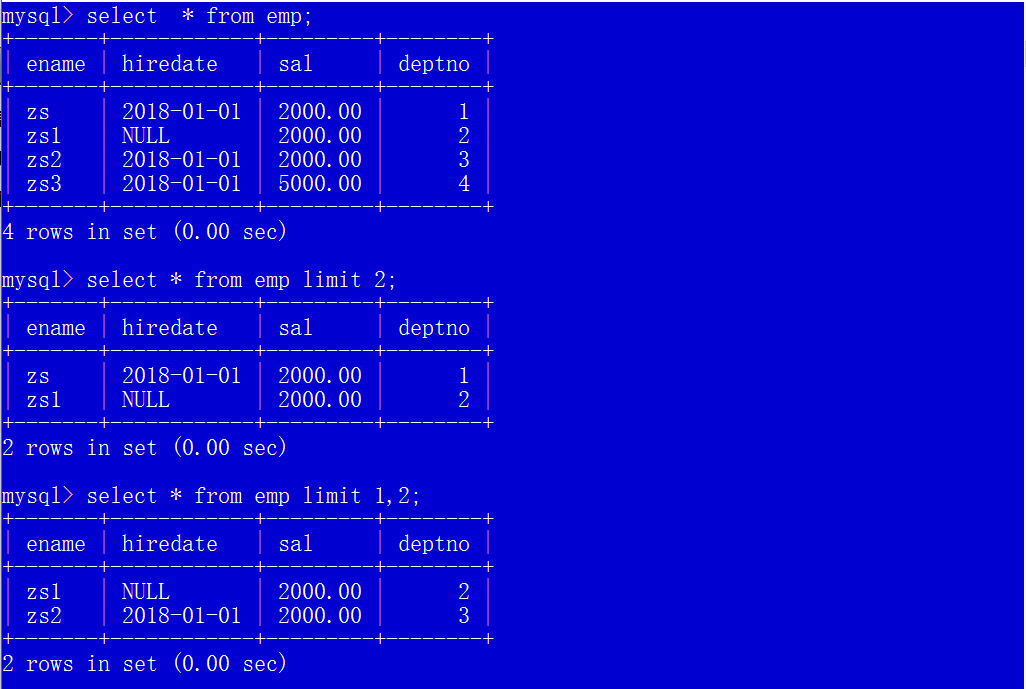
2 count(1),count(字段),count(distinct)
count(1) 所有记录统计值(包含null)
count(字段) 字段不为null的记录统计值(不包含null)
count(distinct) 不重复的记录(不包含null)
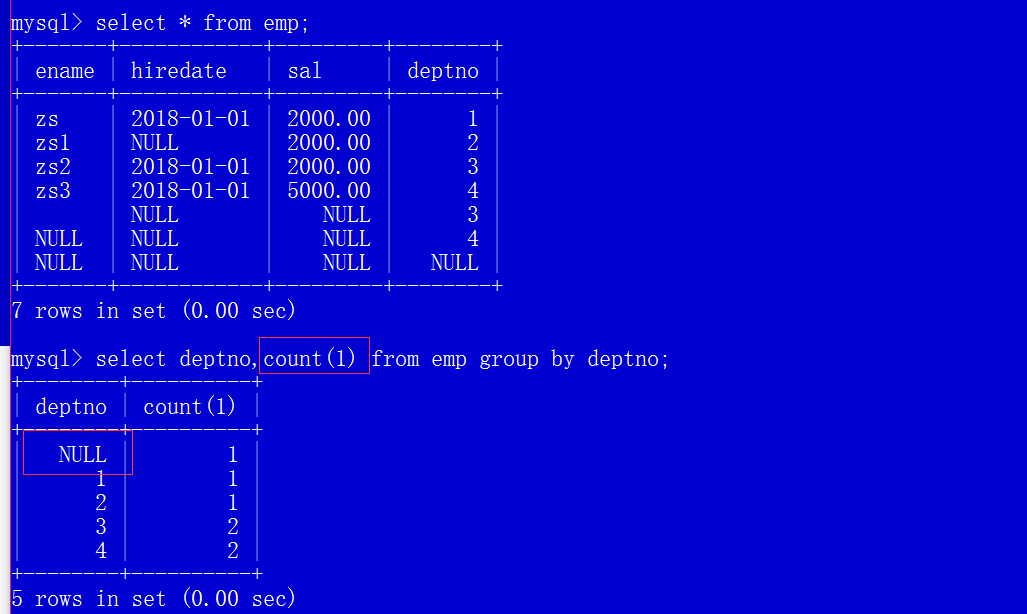
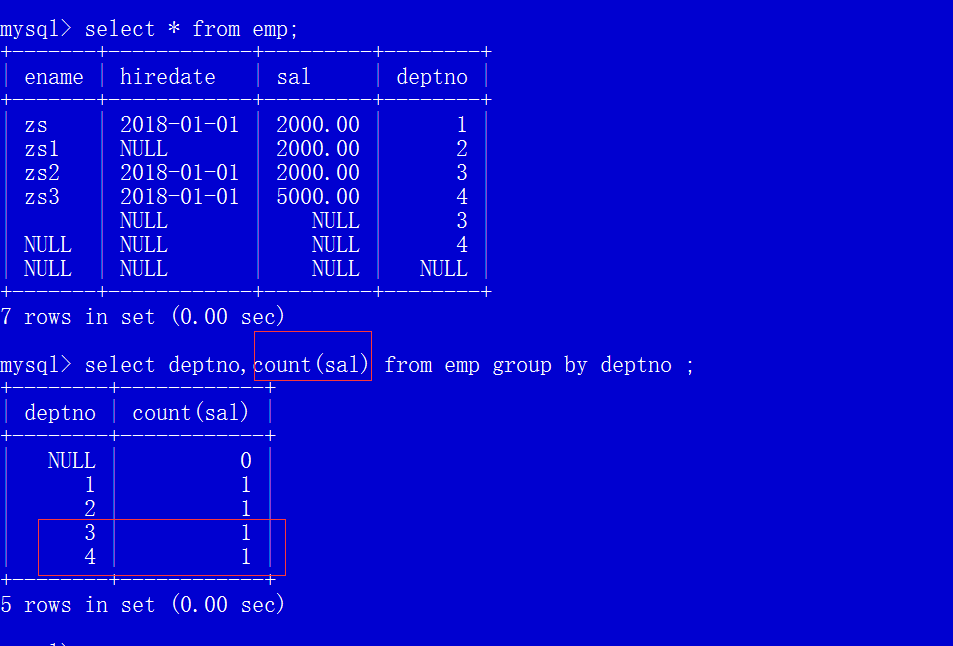

3 with rollup
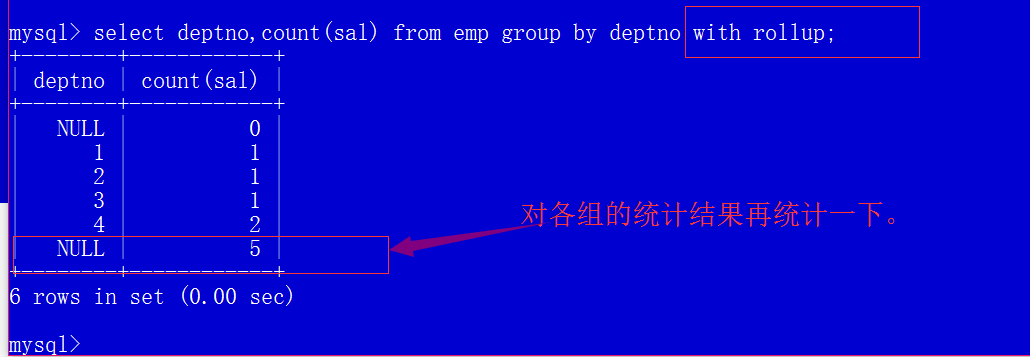
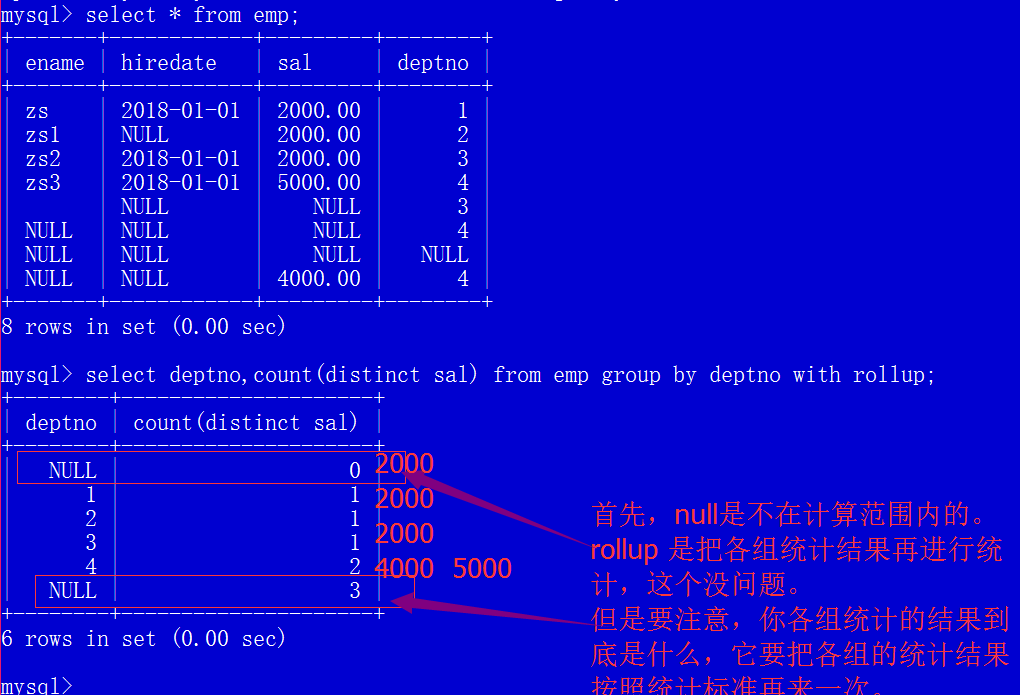
group_concat
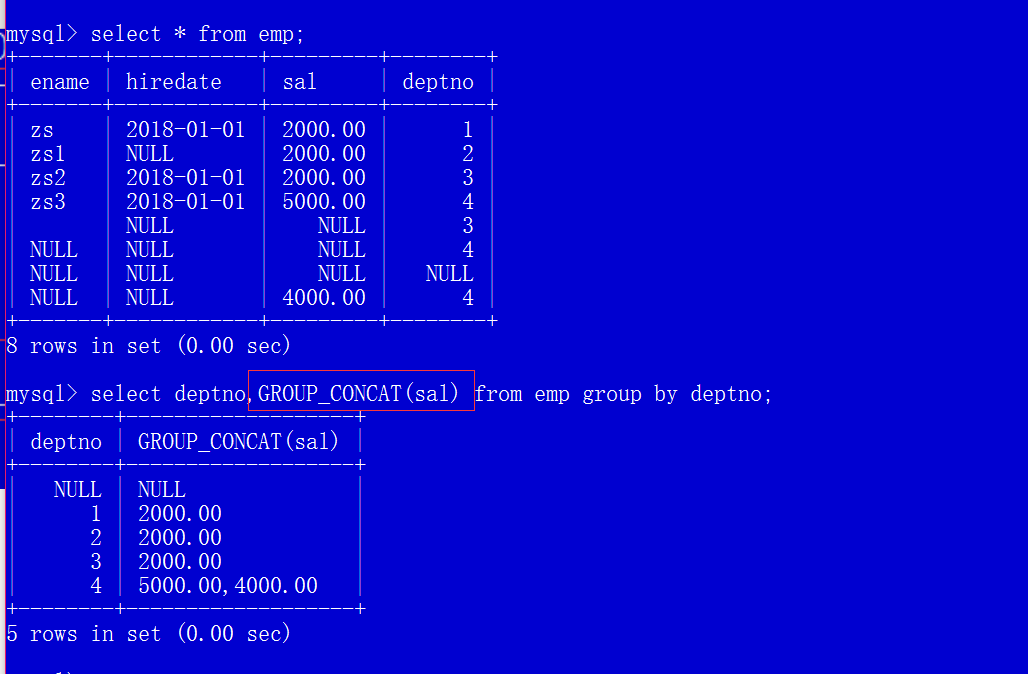
5 DCL(对数据库对象的权限操作) DBA干的活。略
6 视图
//创建视图 create or replace view viewname as select * from emp; //from后面不能有子查询 //修改视图------一般不用 //更新视图-----一般不用 //删除视图 drop viewname; //查询视图定义 show create view viewname;
7 常用运算符
至于:优先级,没必要,用()这玩意解决问题,清晰明了!
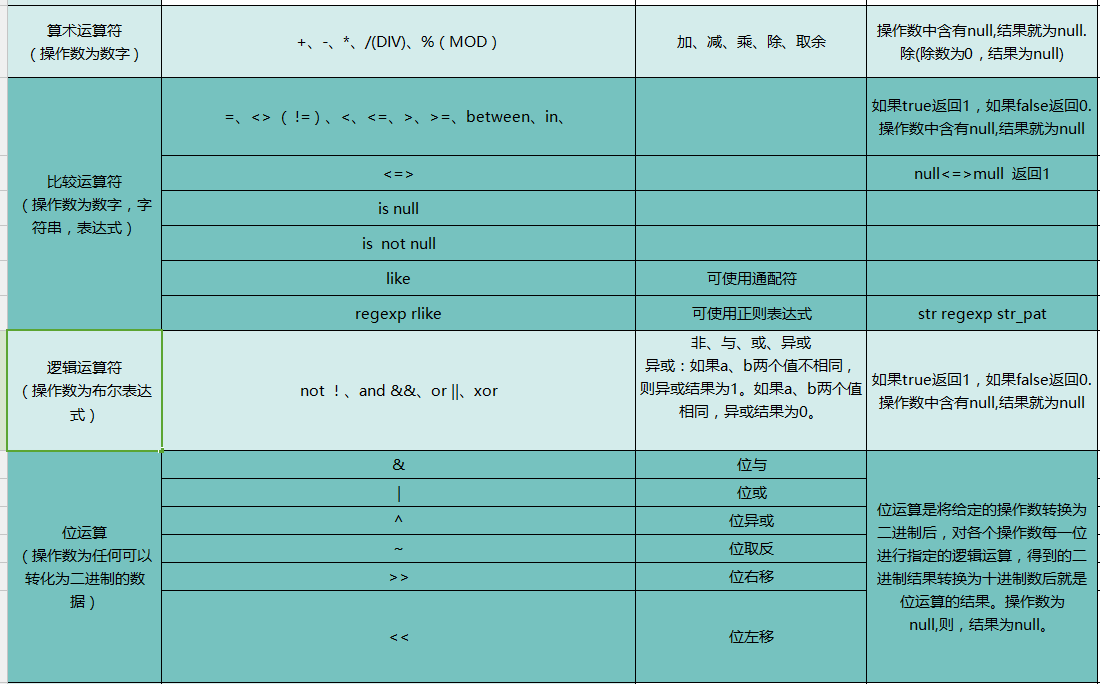
8 常用函数
8.1 聚合函数
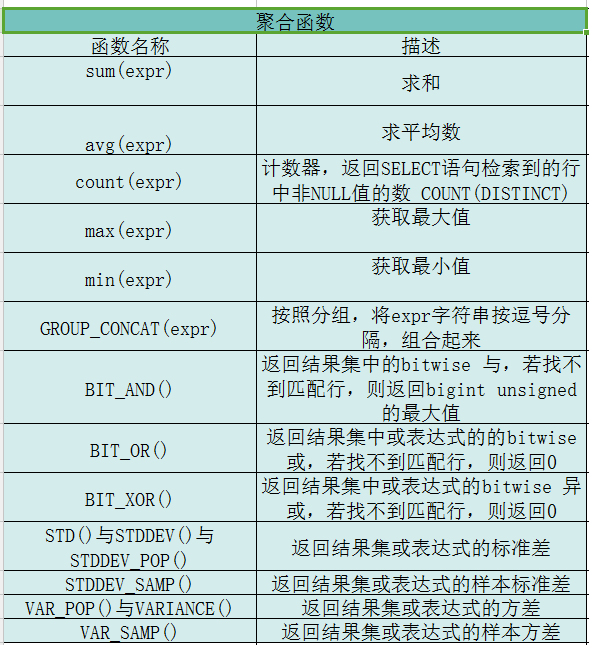
8.2 字符串函数
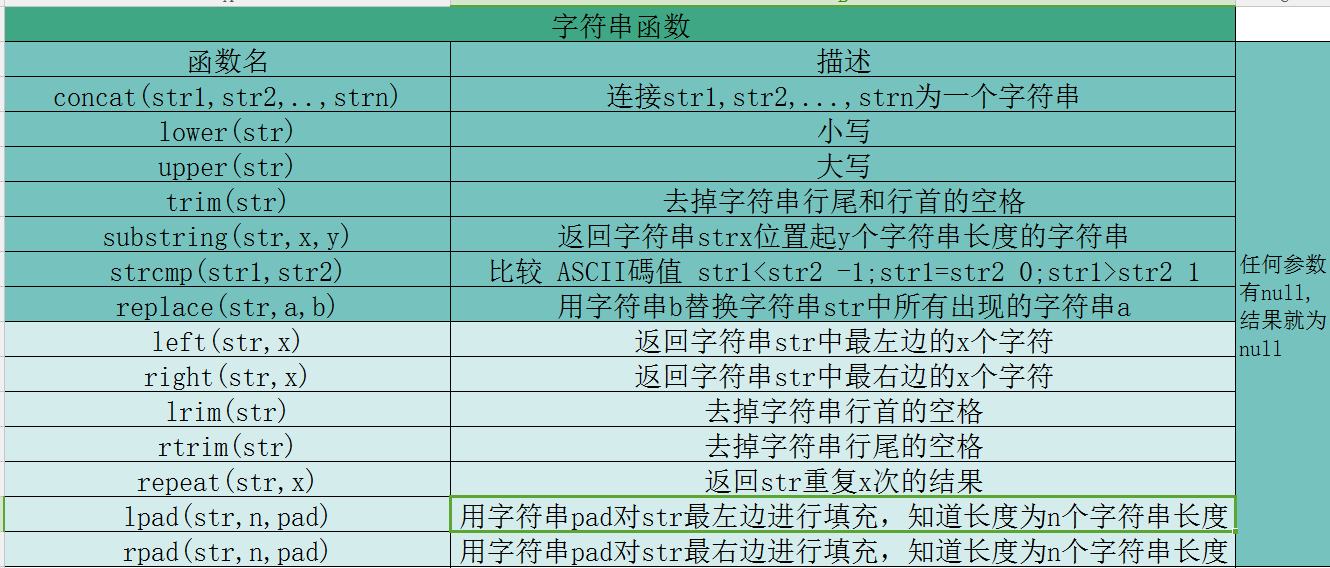
注意:lpad和rpad(如何填充的)
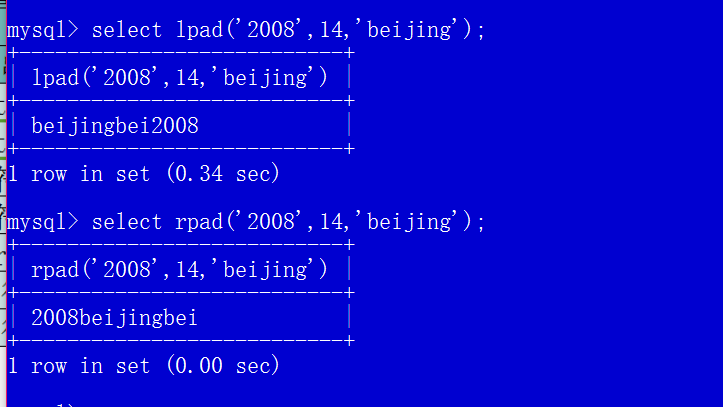
注意:repeat

注意:substring(从1开始)

8.3 数值函数
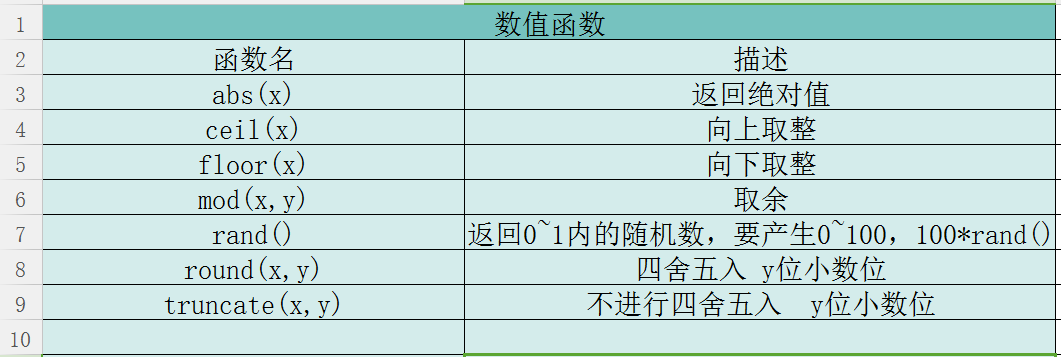
8.4 日期和时间函数
日期:年月日
时间:时分秒
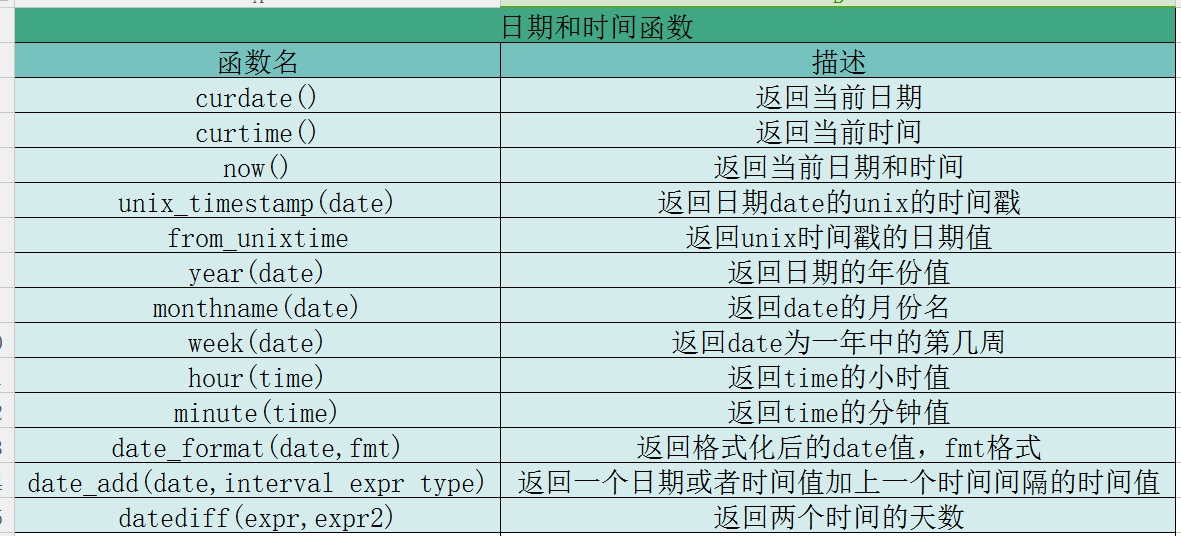
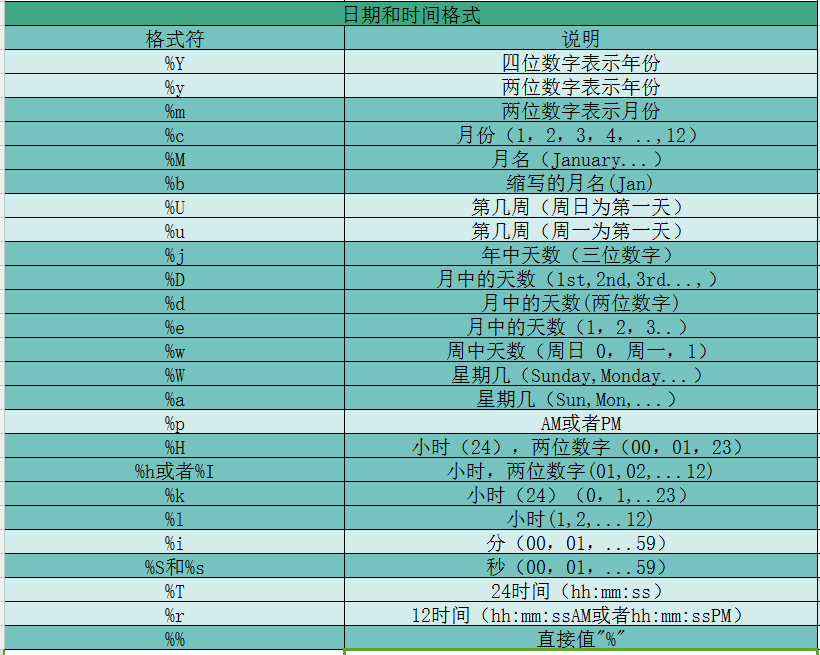
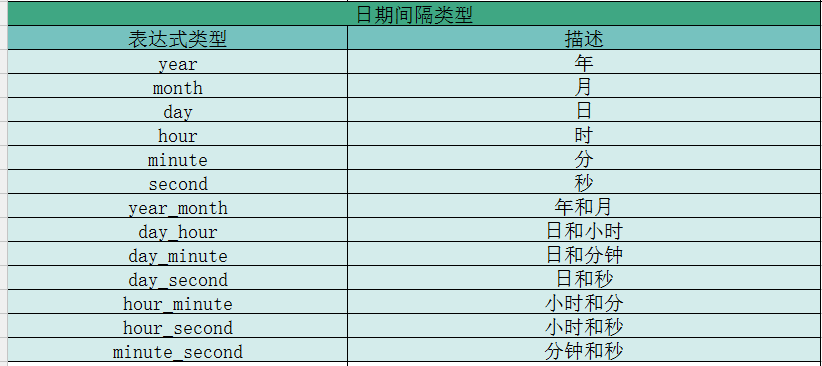
当前日期,当前时间,当前日期和时间
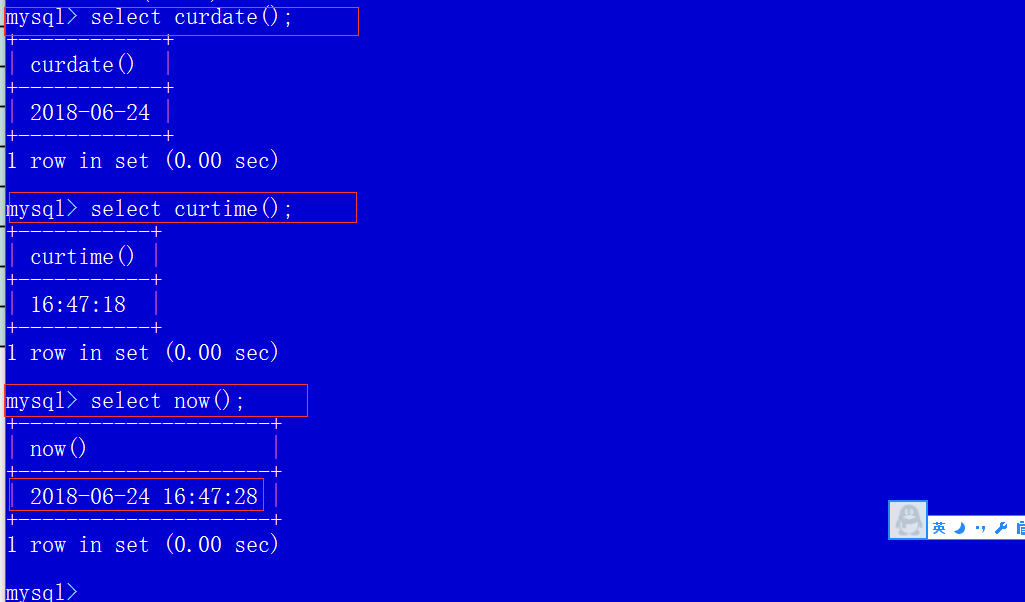
日期和unix时间戳转换
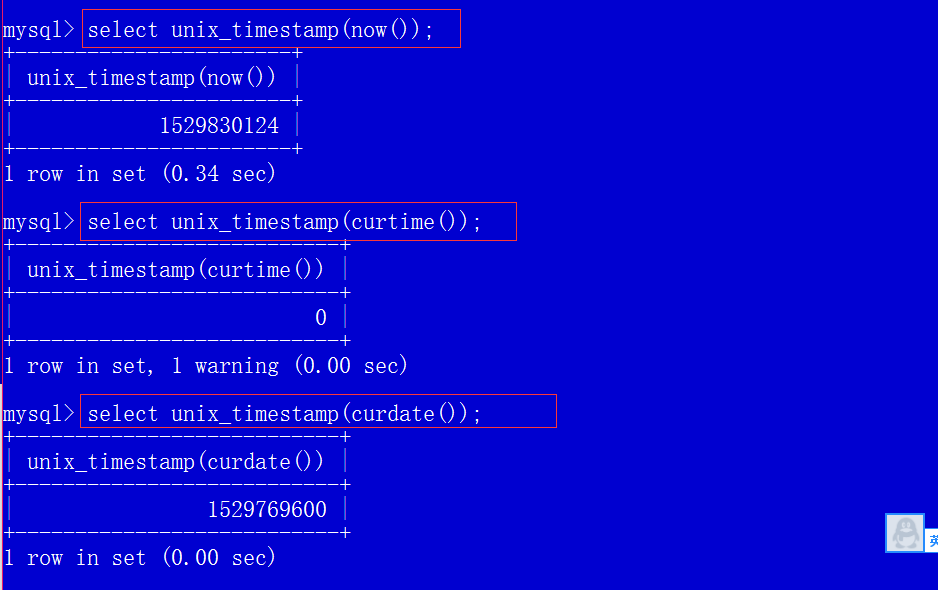
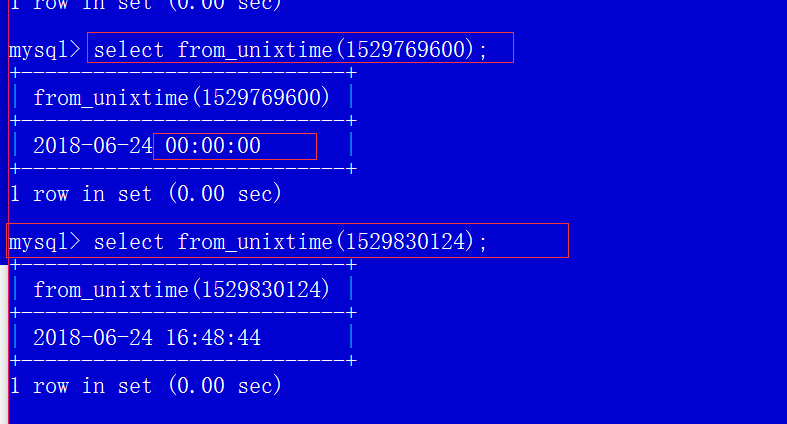
date_format


%U和%u (不懂)
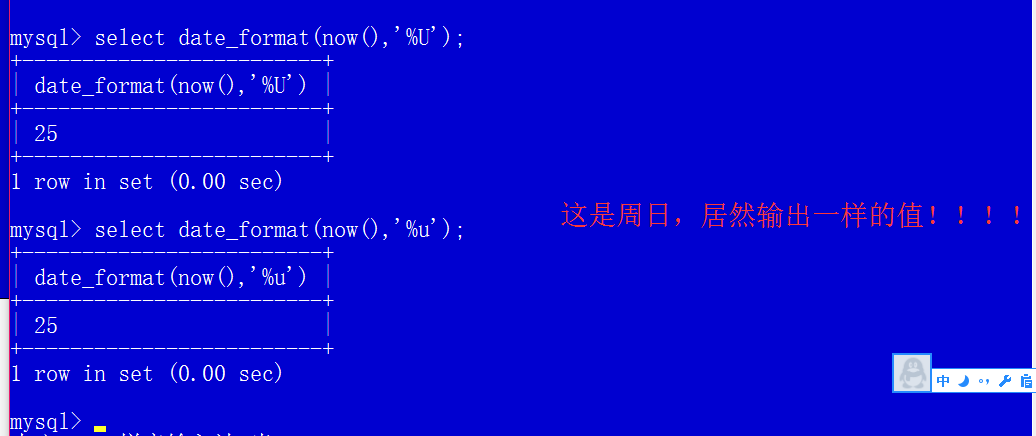
date_add
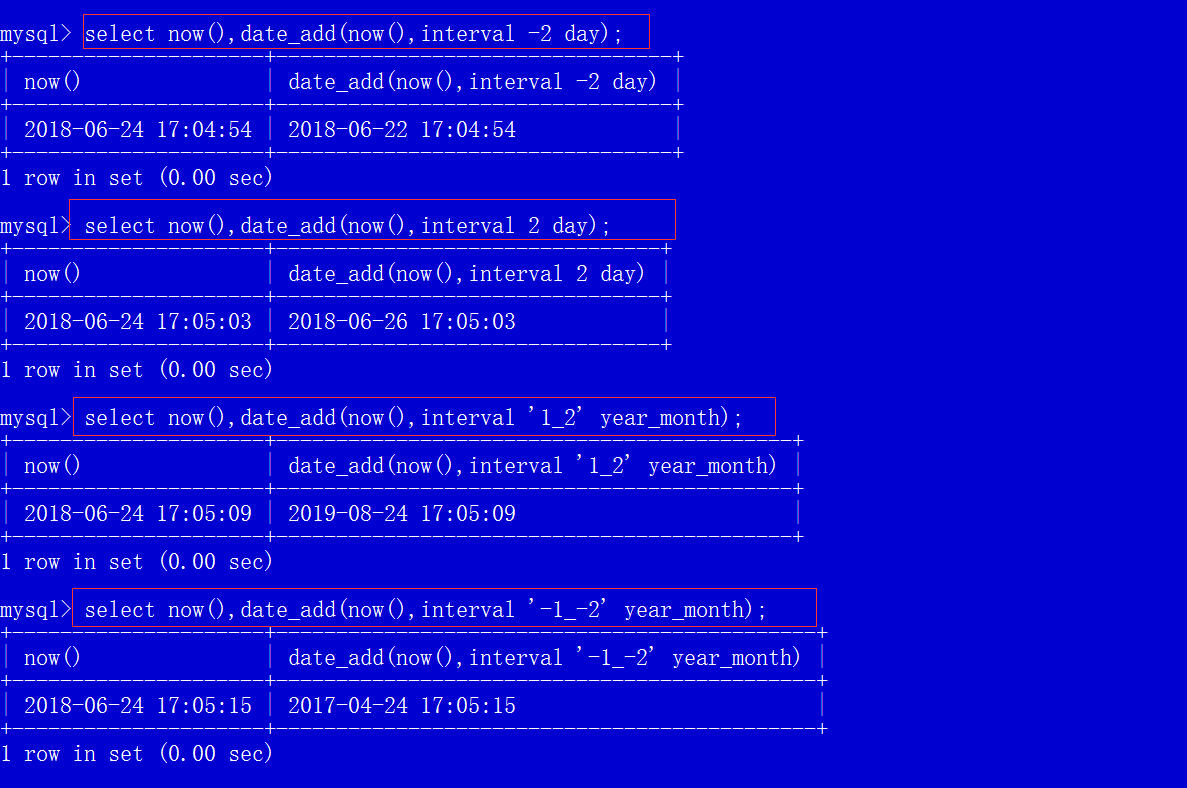
8.5 控制流函数
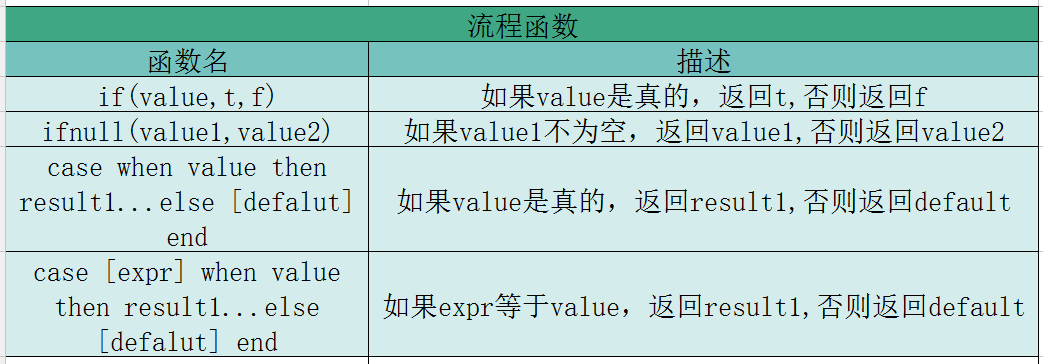


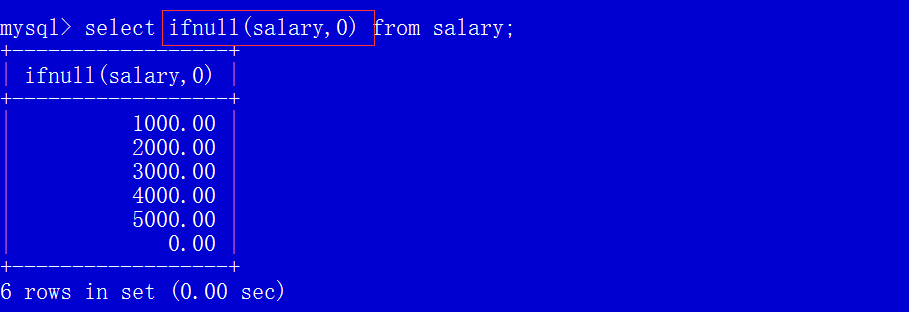


8.6 其它
查看当前用户

附录:(都去mysql官网上找吧~)
1 所有聚合函数:略
2 mysql中所有运算符:略
3 mysql中所有通配符:百分号、下划线和escape

mysql中的正则表达式:略



